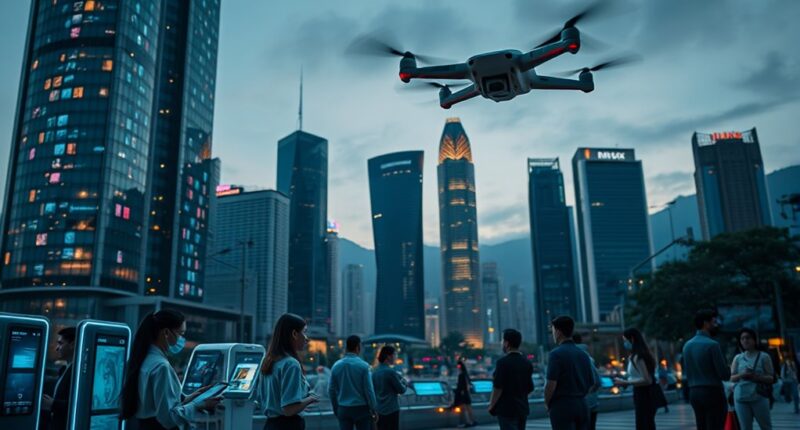Hong Kong is transforming its public services by deploying AI across 200 procedures, making government interactions faster, more efficient, and responsive. You’ll see AI automating data analysis, customer support, and license approvals, reducing wait times and streamlining processes for citizens and businesses alike. This initiative aims to set a new standard for service quality and innovation. Want to discover how this tech-driven change impacts you? Keep exploring to learn more.
Key Takeaways
- Hong Kong aims to automate 200 administrative procedures by 2027 using AI for faster, more efficient public services.
- An AI Efficacy Enhancement Team oversees AI implementation, ensuring alignment with government strategic goals.
- Significant investments, including HK$200 million from Ng Teng Fong Charitable Foundation and HK$1 billion in 2025-26, support AI research and industry.
- AI adoption spans sectors like finance and healthcare, improving fraud detection, diagnostics, and customer services.
- Infrastructure projects, such as the Cyberport AI Supercomputing Centre, bolster Hong Kong’s position as a regional AI hub.

Hong Kong is set to revolutionize its public services by integrating AI into 200 administrative procedures by the end of 2027. This ambitious move aims to make government interactions faster, more efficient, and more responsive. Over the next few years, you’ll notice AI-powered systems handling tasks like data analysis, customer service, and license approvals, reducing wait times and streamlining processes. By focusing on these core areas, the government plans to set a new standard for public service delivery, ensuring citizens and businesses receive timely support. To oversee this transformation, Hong Kong has established a high-level AI Efficacy Enhancement Team, responsible for ensuring the citywide digital shift aligns with strategic goals. This team will monitor AI’s impact, refine implementations, and promote best practices across sectors. The government views AI not just as a tool but as an industry that must be integrated across the economy, fostering innovation and competitiveness.
Hong Kong plans to automate 200 public services by 2027, enhancing efficiency and citizen support through AI integration.
Significant financial investments back this vision. The Ng Teng Fong Charitable Foundation contributed HK$200 million to the Hong Kong Generative AI Research and Development Center (HKGAI), underpinning research efforts and promoting local innovation. These funds support initiatives like InnoHK and the development of HKChat, a chatbot based on a locally developed large language model called HKGAI V1. During the donation ceremony, top officials from finance and innovation sectors emphasized the importance of public-private partnerships in advancing AI. The goal is to make AI more accessible, boost local innovation, and create a sustainable digital economy. Such investments are crucial for Hong Kong’s future, positioning the city as a global leader in AI and digital transformation.
The government’s budget reflects its commitment, with HK$1 billion allocated in 2025-26 specifically for AI research, development, and industrial application. The Cyberport AI Supercomputing Centre, launched recently, boasts computing power reaching 3,000 petaFLOPS—enough to process nearly 10 billion images per hour—providing the backbone for advanced AI applications. Additionally, the Microelectronics Research and Development Institute is working to advance semiconductor technology, leveraging the Greater Bay Area’s manufacturing strengths. Pilot semiconductor production lines will be operational next year, supporting Hong Kong’s AI ecosystem and industry needs. The focus is on developing AI as a core economic sector while upgrading traditional industries through technological innovation.
Hong Kong’s AI growth aligns with China’s 14th Five-Year Plan and the Greater Bay Area’s regional integration. The city is positioning itself as a regional hub for AI, machine learning, and big data, especially in smart city, fintech, healthcare, and logistics sectors. Financial institutions are adopting AI for fraud detection, algorithmic trading, and customer analytics, supported by a robust digital infrastructure. Healthcare providers are using AI for diagnostics and personalized medicine, improving patient outcomes. Clear policies and regulatory frameworks foster innovation while ensuring safety and compliance, making Hong Kong an attractive environment for AI development. Recognizing the high resource requirements, the government also offers support programs to help financial and other sectors adopt AI smoothly, balancing innovation with risk management. Ultimately, this extensive approach aims to elevate Hong Kong’s status as a leading AI-enabled city. Furthermore, the investment in AI technology parallels the growing popularity of animated movies that touch hearts, showcasing the emotional resonance of storytelling in various forms.
Frequently Asked Questions
How Will AI Ensure Data Privacy for Hong Kong Residents?
AI helps guarantee Hong Kong residents’ data privacy by following strict regulations like the PDPO, which requires organizations to minimize data collection and delete personal data when no longer needed. You should implement clear policies and employee training on handling personal data, and adopt privacy-by-design and transparency principles. Additionally, establishing incident response plans and maintaining human oversight helps manage risks and protect individual privacy effectively.
What Is the Timeline for Full Service Integration?
Think of the journey as climbing a mountain step by step. You’ll reach the full service integration by the end of 2027, with 100 procedures supported by AI by 2026. Each milestone is like a rest stop along the trail, guiding you closer to the summit. You’ll see continuous progress, with ongoing refinements even after 2027, ensuring the services become smarter, faster, and more responsive to your needs.
How Will AI Impact Employment in Public Services?
AI will likely reduce employment in routine public service roles by automating tasks like data entry, document processing, and citizen inquiries. However, it also creates new jobs, such as AI system administrators and ethics officers, requiring retraining. You’ll find that AI improves efficiency and allows staff to focus on complex, creative tasks. While some job displacement is inevitable, the overall impact depends on training efforts and how governments manage this progression.
What Measures Are in Place for AI System Security?
You might worry about AI security risks, but Hong Kong has strong measures to protect systems. You’re required to follow strict data privacy rules under the PDPO, implement access controls, encryption, and anonymisation. Organizations must develop AI incident response plans, monitor security continuously, and enforce internal policies around authorized use. These steps help prevent cyberattacks, safeguard personal data, and guarantee AI systems remain safe and trustworthy for public service delivery.
How Will Residents Be Trained to Use New Ai-Powered Services?
You’ll receive hands-on training through workshops and tutorials tailored to your needs, whether you’re elderly or less tech-savvy. These sessions, offered in multiple languages at accessible community venues, will teach you how to use AI-powered services confidently. Support hotlines, user-friendly manuals, and mobile apps will further help you navigate new systems, ensuring you feel comfortable and empowered to access the benefits of AI-enabled public services.
Conclusion
As Hong Kong embraces AI to transform its 200 services, you’re witnessing a future where technology and innovation go hand in hand. This shift promises smoother, more efficient experiences for everyone. Remember, Rome wasn’t built in a day—so, as the city evolves, patience and progress will lead to a smarter, more connected community. Keep watching as AI paves the way for a brighter, more efficient Hong Kong.









